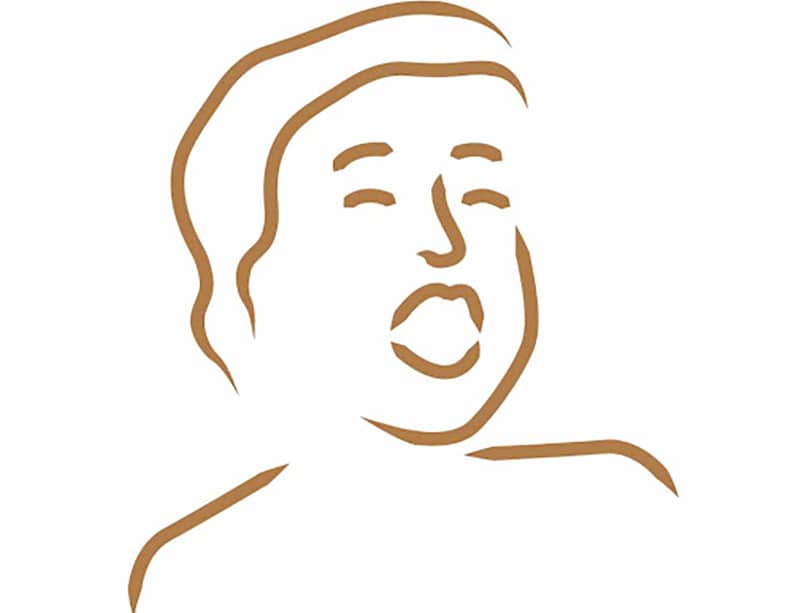The human voice is not just a tool for communication but a reflection of one’s inner world, emotions, and even unconscious processes. But what happens when this voice suddenly disappears? In medicine, this condition is known as aphonia — the loss of a sonorous voice while retaining the ability to speak in a whisper. In most cases, the causes are physiological: laryngeal inflammation, vocal cord strain, or post-surgical effects. However, there is another, less obvious form — psychogenic aphonia — where the voice vanishes without any organic damage, and the root of the problem lies deep within the psyche.
This phenomenon can be seen as a kind of defense mechanism — an unconscious reaction that shields a person from emotions too overwhelming to acknowledge or express. The psyche essentially “shuts off” the voice to protect its owner from pain, fear, or shame associated with speech. For example, imagine someone who has experienced severe psychological trauma: the moment they try to speak about what happened, the words get stuck in their throat, and their voice disappears. This is neither pretense nor a whim — it’s the psyche creating a barrier to prevent retraumatization.
Such cases are often found in literature and real life. Think of characters who lose their ability to speak after a shock — like Sophie from William Styron’s Sophie’s Choice, rendered mute by the horror of her experiences, or real-life stories of people who fall silent after a car accident or assault. These examples show that aphonia can be more than just a medical symptom — it can be a soul’s cry expressed through silence.

Aphonia in the Context of Psychological Defenses
Aphonia as a psychological phenomenon represents a complex defense mechanism in which the psyche uses the loss of voice as a way to cope with unbearable emotions. This condition occurs when a person is physically capable of speaking, yet their voice disappears without any apparent organic cause. In clinical practice, such cases are often linked to deep psychological conflicts and unconscious defensive processes.
Psychogenic aphonia holds a special place among conversion disorders because the voice is not only a communication tool but also a crucial element of self-expression. The loss of voice in this context can be seen as a metaphor—when a person “loses their voice” psychologically, unable to articulate their thoughts and feelings, it may manifest physically as well.
Explaining the Concept of Defense Mechanisms
According to classical psychoanalytic theory by Sigmund Freud, the psyche’s defense mechanisms are unconscious strategies aimed at reducing anxiety and shielding the conscious mind from intolerable experiences. Freud identified several key mechanisms, including repression, projection, and sublimation.
In modern psychological science, the concept of defense mechanisms has been expanded and refined. Contemporary researchers (such as George Vaillant) classify defenses based on their level of maturity:
- Primitive defenses (denial, splitting)
- Neurotic defenses (intellectualization, repression)
- Mature defenses (sublimation, humor)
How Aphonia Relates to Repression, Dissociation, and Emotional Suppression
- Repression: In cases of aphonia, repression manifests as an inability to verbalize traumatic experiences. The psyche “chooses” voice loss as a way to avoid confronting painful memories.
- Dissociation: In dissociative aphonia, there is a disconnection between emotional experience and speech function. Patients often describe the state as “my voice just disappeared on its own.”
- Emotional suppression: Chronic suppression of intense emotions (especially anger or fear) leads to persistent tension in the laryngeal muscles, which can eventually result in functional aphonia.

Causes of Psychogenic Aphonia: Why the Mind Blocks the Voice
The voice is more than just sound—it’s a way to express oneself, to voice feelings and needs. But what happens when a person suddenly loses the ability to speak, even though their vocal cords are physically fine? In such cases, the cause lies not in a throat condition but in the psyche. Psychogenic aphonia emerges as a defense mechanism against emotions that feel unbearable.
This phenomenon can be compared to an internal circuit breaker: when emotions become too overwhelming, the psyche “shuts off” speech to protect the person from further pain. Sometimes, silence is the only available way to cope with what cannot be acknowledged or put into words. But what exactly triggers this mechanism? Let’s examine the key causes.
Psychological Trauma
Psychogenic aphonia often occurs after severe shocks: physical or emotional abuse, the death of a loved one, a disaster, or a car accident. At the moment of trauma, a person may experience such intense shock that the brain literally “switches off” speech to prevent reliving the horror.
- Example: A child who witnesses domestic violence may suddenly lose their voice.
- Mechanism: Trauma triggers dissociation—a state in which consciousness detaches from the experience. As a result, the voice “disappears” because the connection between emotion and speech is severed.
- Aftermath: If the trauma remains unprocessed, aphonia may recur in stressful situations that echo the past.
Inner Conflicts and Suppression
Sometimes, a person loses their voice when facing an internal or external prohibition on expressing their thoughts. This can stem from:
- Fear of authority (a parent, boss, or strict teacher) — when speaking up feels dangerous.
- Suppressed anger — if rage cannot be expressed, the psyche may “block” speech to prevent an outburst.
- A conflict between “should” and “want” — for example, a woman raised in a strict household where she was silenced may lose her voice when trying to assert herself.
Example: An employee who endured years of humiliation from their boss suddenly loses their voice before an important meeting — their subconscious fears they might say the “wrong thing” and face aggression again.
High Anxiety
Anxious individuals often “freeze” in moments when they need to speak. They fear:
- Being mocked or rejected.
- Saying something wrong and appearing foolish.
- Failing to meet expectations (e.g., during an exam or public speech).
In such cases, aphonia acts as an emergency brake — better to stay silent than risk making a mistake.
Example: A student who was mocked for stuttering as a child loses her voice before her thesis defense—her brain associates speaking with humiliation.
Guilt and Shame
One of the deepest triggers of aphonia is the feeling of being “wrong.” If a person believes their thoughts are worthless or that they are “bad,” the psyche may block speech as self-punishment.
- Shame about the past (e.g., after infidelity or an act condemned by others).
- Guilt toward someone (“If I had told the truth back then, this wouldn’t have happened”).
- Low self-worth (“My words don’t matter”).
Example: A man going through a divorce suddenly loses his voice when trying to explain himself to his ex-wife—his subconscious believes he “has no right” to speak.
Psychogenic aphonia is neither a whim nor feigned — it’s the psyche’s cry for help. It says, “There is pain here that cannot be voiced.” To recover one’s voice, it’s crucial not to force speech but to uncover the true roots of silence — whether it’s old trauma, repressed anger, or deep-seated insecurity.

How Does Psychogenic Aphonia Work?
When a person loses their voice without any physical cause, it seems like a mystery. How can the psyche literally “switch off” speech? In reality, it’s a complex defense mechanism involving both the body and the subconscious.
Aphonia isn’t accidental—it’s a programmed response to overload: when emotions become unbearable, the brain “sacrifices” the voice to preserve mental stability. But how exactly does this happen? Let’s examine three key aspects: physiology, subconscious triggers, and the connection to other mental disorders.
Physiology: How the Brain Blocks the Voice
Speech is the result of coordinated work between the brain, nervous system, and muscles. When psychogenic aphonia occurs, this chain malfunctions:
- The brain (particularly emotion-processing areas like the amygdala and prefrontal cortex) sends a distress signal.
- The nervous system shifts into “fight or flight” mode—the laryngeal and vocal cord muscles tense up, causing spasms.
- Breathing becomes shallow, disrupting normal vocal cord vibration—the voice “cracks” or disappears entirely.
Example: After an argument, a person feels a lump in their throat and can’t speak—this is due to muscle tension triggered by stress hormones (cortisol and adrenaline).
Interesting fact: Singers and public speakers sometimes experience functional dysphonia—voice impairment due to stress, even with healthy vocal cords. This confirms that the psyche directly affects vocal function.
The Symbolic Meaning: Why Silence Feels Like Salvation
Aphonia isn’t just a physical process—it’s a metaphor for inner conflict. The subconscious operates on logic like:
- “If I say this, I’ll be rejected/punished/humiliated” → “Better not speak at all.”
- “My words could cause harm” (e.g., confessing to infidelity) → “Safer to stay silent.”
- “I don’t have the right to speak” (due to low self-worth) → “I have nothing to say.”
Key insight: This mechanism often forms in childhood. If a child was punished for crying or speaking up, their adult psyche may block their voice in stressful situations.
Connection to Other Disorders
Aphonia rarely occurs in isolation. It’s linked to other psychological conditions where silence becomes a defense:
- Selective mutism—Inability to speak in specific situations (e.g., at school) despite speaking normally elsewhere (e.g., at home). More common in children.
- Conversion disorder (hysterical aphonia)—When psychological stress “converts” into physical symptoms (voice loss, paralysis, blindness).
- Dissociative states—Feeling “this isn’t happening to me,” accompanied by numbness and an inability to speak.
Example: A soldier loses their voice after combat—a conversion reaction where the psyche transforms unbearable horror into “switching off” speech.
What Unites These Mechanisms?
- Unconsciousness—The person doesn’t choose to stay silent; it happens automatically.
- Protective function—Aphonia shields against deeper pain (shame, fear, grief).
- Reversibility—In a safe environment, the voice often returns naturally (e.g., after therapy).
Psychogenic aphonia isn’t an illness—it’s a signal. It reveals a part of the psyche not yet ready to express emotions openly. Working with a psychologist helps uncover “hidden” feelings and gradually restore the voice.

The Consequences of Chronic Aphonia
Temporary voice loss due to stress is a protective reaction that usually resolves on its own. But when aphonia becomes chronic, it ceases to be just a symptom and transforms into an independent problem that affects all areas of life.
Prolonged silence—especially when caused by psychological factors—does not go without consequences. It alters how a person communicates with others, how they feel in their own body, and even how they perceive their identity.
Chronic aphonia is not merely the absence of a voice. It is a condition that gradually reshapes a person’s life, creating barriers in relationships, triggering physical ailments, and even calling into question their sense of self. Let’s examine the specific consequences of prolonged psychogenic aphonia and why it’s crucial to address its root causes rather than simply trying to “force yourself to speak.”
Communication Breakdown
Humans are social beings, and the voice plays a key role in how we form connections. When the ability to speak is lost for an extended period, it inevitably impacts communication. People with chronic aphonia often face misunderstandings—others may interpret their silence as coldness, arrogance, or disinterest. As a result, relationships become superficial or even fall apart entirely.
This is especially difficult for those whose work depends on speech—teachers, actors, managers. For them, losing their voice can mean not only a personal crisis but also a threat to their career. Even in everyday life, chronic aphonia creates challenges: simple actions like making a phone call or talking to a store clerk become stressful. Over time, the person may start avoiding social interactions, leading to isolation and depression.
Psychosomatic Effects: From Spasms to Real Illness
The body and mind are deeply connected, and if an emotional issue remains unresolved for years, it begins to manifest physically. Chronic tension in the vocal cords and laryngeal muscles can lead to real medical conditions. For example, people with long-term psychogenic aphonia often develop laryngitis, pharyngitis, or even vocal nodules—despite having no initial physiological cause for these issues.
Another common consequence is thyroid dysfunction. Medicine has long observed a link between suppressed emotions (especially anger and resentment) and thyroid disorders. The throat is where unspoken words “settle,” and if a person remains silent about their distress for years, it can take a toll on their health. Additionally, chronic muscle tension in the neck and shoulders often leads to headaches and even spinal problems.
Loss of Self-Identity: The “Who Am I?” Crisis
The voice is more than just a communication tool—it’s tied to our identity: how we assert ourselves, express opinions, and set boundaries. When a person cannot speak for a long time, they begin to lose connection with themselves. Painful questions arise:
- “Who am I if I can’t express my thoughts?”
- “Do I even have the right to exist if no one hears me?”
This is especially devastating for those who previously relied on their voice for their profession or creativity. Singers, lecturers, and public speakers who suddenly lose their ability to speak often describe it as “losing a part of themselves.”
But even those who didn’t prioritize speech face a deep crisis: if you remain silent for years, you gradually forget that you even have the right to a voice. This can lead to a loss of self-confidence, feelings of invisibility, and even depersonalization—a sense of watching your own life from the outside.
Why Early Intervention Matters?
Chronic aphonia is not just an inconvenience—it’s a condition that slowly but steadily erodes quality of life, undermining both physical health and mental well-being. The longer a person lives without a voice, the harder it becomes to reclaim it—not only because muscle tension solidifies but also because they lose faith that their words matter.
The good news is that this process is reversible. Therapy, somatic practices, and gradually rebuilding self-trust can help a person regain their voice—both literally and figuratively. The key is to recognize that if aphonia has become chronic, it’s a sign that something in life has long demanded attention and healing. The first step toward recovery is acknowledging that silence is no longer protecting you—it’s harming you.

How to Regain Your Voice? Therapeutic Approaches
Losing your voice due to psychological reasons isn’t a life sentence. Modern psychology and medicine offer numerous ways to restore speech. It’s important to understand: since psychogenic aphonia is the psyche’s defense mechanism, you can’t simply “decide to start speaking.” A comprehensive approach addressing both physical symptoms and underlying psychological causes is required.
Recovering from psychogenic aphonia is like untangling a knot – you need to gradually uncover suppressed emotions, release physical blocks, and relearn how to use your voice as a tool for self-expression. Here are proven methods to navigate this journey:
Psychotherapy: Addressing Root Causes
- Cognitive Behavioral Therapy (CBT) helps identify and change negative thought patterns that block speech. For instance, if someone believes “I’ll be rejected if I speak up,” the therapist helps reframe this belief into more adaptive thinking. CBT is particularly effective for anxiety-related aphonia.
- Body-Oriented Therapy focuses on physical tension that inhibits vocalization. Through specialized exercises, patients learn to recognize where suppressed emotions manifest in their body (like throat tightness) and gradually release them.
- Gestalt Therapy works with unresolved past situations that may cause voice loss. Therapists help clients express “frozen” emotions and complete unfinished dialogues (e.g., with parents or abusers), lifting internal speech prohibitions.
Physical Approaches: Releasing the Voice
- Breathing Exercises are fundamental. Aphonia often disrupts natural breathing rhythms. Diaphragmatic breathing techniques (hand on abdomen, breathing into belly rather than chest) help relax laryngeal spasms.
- Vocal Therapy gently reintroduces voice through progressive exercises: starting with humming (“mmm”), progressing to vowels, then words. Combining sound with movement (e.g., swaying while vocalizing “ah”) can help.
- Jaw Relaxation is crucial since many with aphonia clench their jaws. TMJ massage, yawning exercises, and awareness of stress-related teeth grinding help release tension.
Art Therapy & Writing: Alternative Expression
- Art Modalities (drawing, sculpting, dance) provide safe outlets for emotions blocking speech. “Drawing your voice” – visually representing what your voice might look like – can be particularly revealing.
- Journaling organizes thoughts and voices unspoken words. Start with prompts like “Today I feel…” or “I wish I could say…” to pave the way for oral communication.
- Empty Chair Technique: Imagining a recipient of unspoken words (seated in an empty chair) while speaking or writing them helps release emotion-based blocks.
Medication (When Appropriate)
In cases where aphonia is accompanied by significant anxiety or depression, temporary pharmacological support may be indicated. Antidepressants (such as SSRIs) can help reduce overall anxiety levels, potentially making psychotherapeutic work more effective. Mild herbal sedatives (valerian, motherwort) are sometimes used to relieve acute episodes of fear associated with the need to speak.
It’s important to understand that medication alone doesn’t resolve the underlying issue of aphonia, but rather creates more favorable conditions for psychotherapy to be effective. Any prescription should be medically justified and administered only by a qualified psychiatrist or psychotherapist.
The most effective approach combines multiple therapeutic methods. For example: morning breathing exercises, afternoon psychotherapy sessions, and evening journaling. Gradually, step by step, the voice returns – initially quiet and uncertain, then progressively more confident. The key principle is not to force recovery, but to create conditions where the voice naturally wants to reemerge.

Conclusion
Psychogenic aphonia is not a malfunction, but a wise, albeit painful, self-defense mechanism. Our psyche works in remarkable ways: when emotions become too heavy and words too dangerous, it finds a radical way to protect us from pain – by taking away our voice.
This is neither weakness nor caprice, but a soul’s cry that sounds in silence. Behind every case of sudden speech loss lies a story – of fear that paralyzes the larynx, of shame that tightens the vocal cords, or of trauma that “freezes” words deep inside.
Attempts to force speech through persuasion, demands, or reproaches are not only futile but harmful. They only strengthen internal resistance. Instead, it’s crucial to create a safe space where the voice can return naturally, without violence to the psyche.
It’s like handling a wild animal: the more we push, the deeper it hides. But with patience and understanding, it will eventually emerge on its own. So too with the voice – it returns when the threat disappears, when a person feels they’ll be heard without judgment, accepted unconditionally, understood without explanations.
The phrase “The voice will return when it’s ready to be heard” isn’t just a beautiful metaphor. It’s a fundamental principle of working with psychogenic aphonia. The voice is part of one’s identity, and its disappearance always relates to something important: suppressed truth, unspoken love, or unprocessed loss.
Sometimes time is needed – to heal old wounds, gather scattered parts of oneself, or simply find courage. And when this happens – when a person becomes internally ready to face what has been silent for so long – the voice returns by itself, like a spring stream after a long winter.
This, perhaps, is aphonia’s most important lesson: our body and psyche are wiser than we think. They know when to stay silent and when to speak again. To trust this process doesn’t mean passive waiting. It means gently exploring the reasons for silence, accepting one’s limitations, and gradually, step by step, restoring connection with one’s own voice. Because the right to speak isn’t just a physical ability – it’s a fundamental part of human dignity. And when we reclaim this gift, we regain not just sound, but wholeness.




